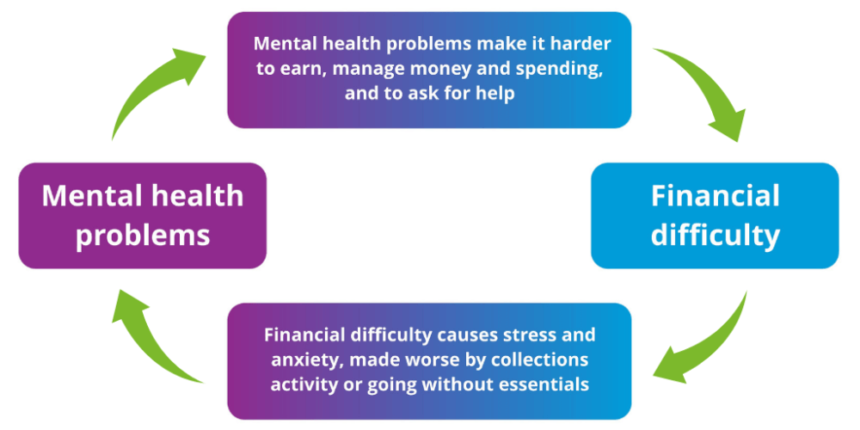When it comes to financial issues, the focus often falls on numbers. We talk about budgets, expenses, and debt, but rarely do we consider the emotional and psychological factors at play. According to financial therapists, many money problems aren’t actually about money at all. Instead, they often stem from deeper issues like self-esteem, trauma, or a scarcity mindset. By understanding these root causes, you can gain clarity and start making meaningful changes in your financial life. Let’s dive into the emotional landscape of money management and explore how addressing these underlying issues and tools such as debt resolution programs can lead to better financial health.
The Emotional Weight of Money
For many people, money is more than just a tool for purchasing goods and services. It’s intertwined with emotions and personal beliefs. This relationship can create significant stress, leading to unhealthy financial habits.
- Self-Esteem and Spending
For some, spending money can be a way to boost self-esteem. Have you ever bought something you didn’t need just to feel better about yourself? Many people do this, often without realizing it. This behavior can become a cycle where individuals feel temporary happiness from their purchases but ultimately feel guilty or ashamed afterward.
If you find yourself shopping to feel good or to escape from negative emotions, it’s important to recognize this pattern. Understanding that your spending might be a reflection of your self-worth can help you shift your mindset. Instead of buying things to feel better, you can focus on building your self-esteem through healthier means, such as setting and achieving personal goals.
The Role of Trauma
Experiences from your past can also have a lasting impact on your relationship with money. Whether it’s financial hardship during childhood or emotional trauma from a significant life event, these experiences can shape how you manage your finances today.
- Financial Trauma
Financial trauma is a term that refers to the emotional pain associated with financial struggles. If you grew up in a household where money was a constant source of stress, you might carry that anxiety into adulthood. This can manifest as fear of spending, compulsive saving, or even avoidance of financial planning altogether.
Recognizing that your financial habits might stem from past experiences can be a powerful step toward healing. Seeking help from professionals, such as financial therapists or counselors, can provide valuable insights into how your past affects your current behavior. They can guide you through the process of working through these feelings, allowing you to develop a healthier relationship with money.
Scarcity Mindset
Another major contributor to money problems is a scarcity mindset. This is the belief that there will never be enough resources, whether it’s money, time, or opportunities. This mindset can lead to fear-driven financial decisions that ultimately create more problems.
- Understanding Scarcity Mindset
A scarcity mindset often leads individuals to feel anxious about their financial situation. This anxiety can cause people to make impulsive decisions, such as overspending to cope with feelings of lack or hoarding money due to fear of future scarcity. Unfortunately, this cycle can perpetuate feelings of anxiety and create a self-fulfilling prophecy.
The key to breaking free from this mindset is to cultivate an abundance mindset. This involves shifting your focus from what you lack to what you have. Practicing gratitude for your resources, whether it’s your income, skills, or support system, can help change your outlook on money. By recognizing the abundance in your life, you can make more informed and positive financial decisions.
Taking Action: Steps to Address Your Money Problems
Now that you understand the root causes of your money problems, it’s time to take action. Here are some strategies to help you address these issues and move toward a healthier financial future:
- Seek Professional Help
Consider working with a financial therapist or counselor who specializes in the emotional aspects of money management. They can help you explore your beliefs about money and work through any trauma or self-esteem issues that may be affecting your financial decisions.
- Join a Support Group
Sometimes, discussing your struggles with others who understand can be incredibly healing. Look for support groups focused on financial wellness or emotional spending. Sharing your experiences can help you gain new perspectives and coping strategies.
- Develop a Budget with Intent
Creating a budget is an essential step in managing your finances. However, it’s crucial to approach budgeting with intention. Instead of merely focusing on what you can cut back, consider what aligns with your values. Allocate funds for things that genuinely bring you joy and fulfillment, while also setting aside money for savings and debt repayment.
- Practice Mindfulness
Mindfulness can help you become more aware of your spending habits and emotional triggers. Take a moment before making a purchase to ask yourself why you want to buy something. Is it out of necessity, or are you trying to fill an emotional void? This awareness can empower you to make more intentional decisions.
Moving Forward
Understanding the root causes of your money problems can be a transformative journey. By addressing emotional factors like self-esteem, trauma, and scarcity mindset, you can break free from unhealthy spending patterns and make more informed financial decisions. Remember, seeking help is a sign of strength, and taking small steps can lead to significant changes. With the right support and mindset, you can develop a healthier relationship with money and achieve your financial goals.
Conclusion
The road to financial wellness is not just about numbers; it’s about understanding yourself and your relationship with money. By addressing the emotional undercurrents of your spending habits, you can create lasting change and pave the way to a more secure financial future. Whether it’s through debt resolution programs, professional help, or personal reflection, every step you take is a step toward empowerment. Start your journey today and reclaim your financial well-being!






